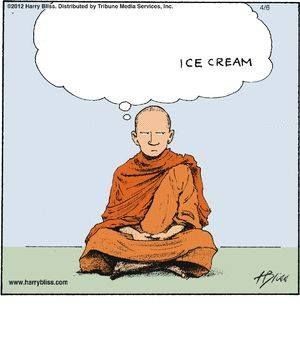A core principle behind meditation is “non-judgement”. But what does that mean?
Meditation gurus say all the time “practice non-judgmentally”.
There are multiple ways to interpret this, all being valid.
When people start a meditation practice they have a tendency to enter with expectations. “I want to feel enlightened.” “I want to feel inner peace” “I want to control my anger” “I want to be more wise” “I want to feel _____”.
So they take the seated position & they meditate.
What happens? They feel nothing. They get to the end of their session, feel the exact same as they did prior to meditating.
“Man I had a bad practice”
Inversely, someone sits down to meditate & in their first session they DO feel something. They feel inner calm, inner peace.
“Man I had a great practice!”
Either way, they sit down again the next day for their meditation practice & do not experience the same results. “What the heck! This sucks!” Then they quit.
Judgement.
There is no such thing as a good meditation or a bad meditation. Meditation is simply meditation. Every session should be approached with the same goal in mind. Being as present as possible while in it.
The key is to lose your expectations. ESPECIALLY when new to the practice. Chances are you do not practice mindfulness through your entire day. Recognize this. When you are sitting to meditate you are attempting to touch that present moment. You are attempting to fully tap your awareness into right now.
In an extremely noisy world, this is no easy feat.
So first & foremost, when we talk about non-judgement we need to recognize that the way we label our practice mentally influences our ability to practice.
If you approach the session with the goal of having a “good” or “bad” practice, how are you able to fully focus on being present? Your mind is wrapped up in trying to produce a specific reaction.
Let’s go a bit deeper into this principle
When we are practicing? The number one issue most meditators have is with their own thoughts.
“I cant stop thinking.” “This is a bad practice, my mind is so active.”
Let’s take a step back & recognize what thoughts are. Ready? Time to go deep.
Thoughts are… thoughts. Nothing more, nothing less.
Thoughts come, thoughts go.
When you are seated meditating thoughts start to arise. When you apply a label to them in your mind while practicing, how are you being present?
Is your awareness on your breath? Coming in & going out? Or is your awareness on the thoughts that are in your head?
You put your awareness on your thoughts & then you start to JUDGE them.
That’s the thing with thoughts. You may have things arise in your head that make no sense at all. COMPLETELY RANDOM thoughts. Why do they deserve attention? Why do they deserve judgement?
They don’t.
“So Fighter, what do I do about these thoughts?!?”
Recognize them, then bring your awareness back to your breath.
They come back up? Recognize them and go back to your breath.
Do this over and over and over and over again. Each time you consciously bring yourself back to your breath & hone in on the present moment you train your awareness. Your “ability” to meditate “efficiently” increases because you are able to stay present more in a given practice.
You are not your thoughts. Your thoughts can influence you, but you are not them.
This same principle applies to the emotions that may come about during a practice. Feel your emotions, note them & go back to the breath.
Do not judge them, they deserve no such judgement. Allow them to be present with you just as you are trying to be present with right now.
Stay BLESSED
Fighter (link to Twitter)
P.S. You can learn mindfulness & introductory breathwork from me directly here: Daily Practice Consult Call




